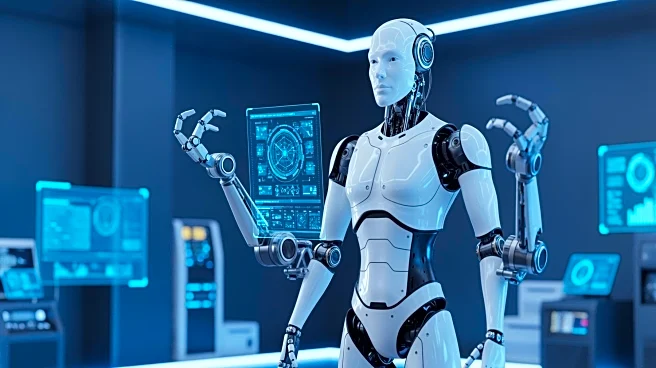What's Happening?
Elon Musk has publicly acknowledged the competitive threat posed by Chinese EV maker XPENG's newly unveiled humanoid robot, IRON. XPENG's IRON robot, showcased at the company's 2025 AI Technology Day, features advanced humanoid capabilities, including
a 'bone-muscle-skin' framework that mimics human anatomy. The robot boasts 82 degrees of freedom across its body, with 22 degrees of freedom per hand, allowing for delicate manipulation tasks. It is powered by an all-solid-state battery, a first in the industry, offering higher energy density and safety. XPENG aims to leverage its automotive supply chain to mass-produce IRON by the end of 2026, targeting commercial environments initially.
Why It's Important?
The development of XPENG's IRON robot signifies a shift in the global humanoid robotics race, with China emerging as a formidable competitor to Silicon Valley. The robot's advanced capabilities and planned mass production could position XPENG as a leader in the industry, challenging Tesla's Optimus robot. This competition highlights the growing importance of robotics in industrial applications and consumer markets, potentially influencing future technological advancements and economic dynamics. The race between Tesla and XPENG could drive innovation and set new standards for humanoid robots, impacting industries reliant on automation and AI.
What's Next?
XPENG plans to begin production preparation for IRON in April 2026, with mass production targeted by the end of the year. The company intends to deploy the robot in controlled commercial environments, such as retail showrooms, to gather operational data and validate its capabilities. XPENG is also releasing a Software Development Kit (SDK) for IRON, inviting third-party developers to expand its functionalities. This open platform strategy aims to foster a developer ecosystem and unlock new use cases. The competition between Tesla and XPENG is expected to intensify, with both companies pursuing different strategies to dominate the humanoid robotics market.
Beyond the Headlines
XPENG's approach to humanoid robotics emphasizes extreme anthropomorphism, aiming to overcome the 'uncanny valley' and achieve social acceptance. The company's focus on privacy, ensuring data does not leave the robot, addresses growing concerns about data security in AI systems. XPENG's strategy to leverage its automotive supply chain for robot production highlights the convergence of automotive and robotics industries, potentially reshaping manufacturing processes and supply chain dynamics. The success of XPENG's IRON could influence global perceptions of Chinese technological capabilities and impact geopolitical relations in the tech sector.















